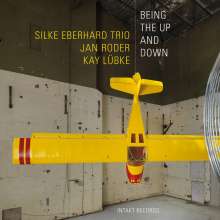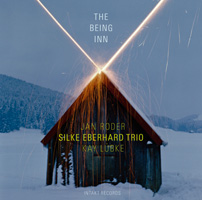“Eberhard also leads a superb trio … In this stellar configuration Eberhard presents her own compositions, flexible and attrictive vehicles rooted in hard-swinging post-bop that nevertheless provide her with great freedom.“ (Downbeat Magazine, Peter Margasak)

Silke Eberhard (altosaxophone) / Jan Roder (bass) / Kay Lübke (drums)
»Being the Up and Down«, Silke Eberhards neue Trio-CD mit Jan Roder am Bass und Kay Lübke am Schlagzeug, wurde sowohl im Studio als auch bei einem Live-Konzert im A-Trane in Berlin aufgenommen. Als Gewinnerin des Jazzpreis Berlin 2020 hatte Eberhard die Ehre, ein Konzert zu spielen und Aufnahmen zu machen.
Die amerikanische Jazzkritikerin Lynn René Bayley schreibt im Booklet: »Ob sinnlich oder kantig und experimentell, es gibt so viel zu mögen und zu hören in Silke Eberhards Spiel, sowohl solo als auch im Zusammenspiel mit dem Trio, dass man von der ersten bis zur letzten Note in den Bann gezogen wird. Kein Wunder, dass sie in der deutschen Jazzwelt ein so hohes Ansehen genießt!«

 SILKE EBERHARD TRIO. THE BEING INN.
SILKE EBERHARD TRIO. THE BEING INN.
Silke Eberhard: Alto Saxophone, Bass Clarinet, Jan Roder: Bass, Kay Lübke: Drums. Intakt CD 280 / 2017
PREIS DER DEUTSCHEN SCHALLPLATTENKRITIK – GERMAN RECORD CRITICS AWARD 2017/4
ONE OF 10 BEST JAZZ ALBUMS IN 2017, BERLINGSKE/DENMARK
It’s no secret that reedist Silke Eberhard is a keen student of jazz history, a player whose inspiration routinely gets rechar- ged by immersing herself in the music of her early heroes. For her that means more than listening to old records by the likes of Eric Dolphy, Charles Mingus, and Ornette Coleman (the subject of Eberhard’s 2007 Intakt debut, a duo album with pia- nist Aki Takase titled Ornette Coleman Anthology) – but diving into that repertoire and reshaping it with novel instrumentation.
But Eberhard makes it clear that the trio featured on The Being Inn is the context for which she always imagines her own material. “I feel a lot of freedom with this group,” she says of working with bassist Jan Roder and drummer Kay Lübke. Although this particular group coalesced in 2006, her history with each player stretches back to the mid-90s and there’s no missing the rapport they’ve all developed together.
Eberhard and company make a conceptual leap on the album, with many of the pieces tied to the titular concept – an imaginary inn the saxophonist pictured as she composed numerous tunes. She jokes that the spry opening track, “Ding Dong,” is the kind of number she likes to open one of the trio’s sets with – “a door bell,” she calls it, although the first sounds we actually here are her footsteps leading toward a door that soon opens, inviting the listener in.
(Peter Margasak, from the liner notes)
*****
PREIS DER DEUTSCHEN SCHALLPLATTENKRITIK (4/2017): Die CD “The Being Inn” ist mit dem Preis der deutschen Schallplattenkritik (Bestenliste 4/2017) ausgezeichnet worden.
Jurymitglied Bert Noglik schreibt in der Begründung: “Das Album gleicht einer Einladung in das imaginäre Gasthaus, das sich die Berliner Altsaxophonistin und Bassklarinettistin Silke Eberhard beim Schreiben der Stücke vorstellte – ein Ort, an dem die moderne Jazztradition im Raum schwebt und im gemeinschaftlichen Spiel neu ausgeformt wird. Dabei sind die Fenster weit geöffnet, so dass sich bei allen Reminiszenzen an die Geschichte dieser Musik ein beglückendes Gefühl von Freiheit einstellt. Jan Roder am Kontrabass und Kay Lübke am Schlagzeug weben ein spannendes Beziehungsgeflecht und treten als Gesprächspartner der Bandleaderin wie auch selbst als Solisten hervor, so dass ein vielfältig ausdifferenzierter Trioklang entsteht, der sehr eigen ist und zugleich vertraut anmutet.”
all Reviews: Intakt Records
*****
REVIEWS:
Best of 2008! Chicago Reader – Post No Bills, by Peter Margasak, Silke Eberhard Trio, Being (Jazzwerkstatt) Young Berlin reedist Silke Eberhard has caught my ear before–particularly on a program of Ornette Coleman tunes recorded with pianist Aki Takase – but she really hits pay dirt here. Her tart tone clearly influenced by Ornette, she braids her generous improvised melodies through swinging structures sketched out by bassist Jan Roder (Die Enttäuschung) and drummer Kay Lübke.
LOOKING BACK FORWARD:
This music pours and swings itself with determination into that jazz tributary called „New Thing“, which has been flowing for more than half a century. It is an emphatic claim of responsibility from the successors of Dolphy, Coleman, Mingus, Monk(..)Though Silke Eberhard´s music comes departs from there, it is completely original – in the source material she selected, in its fascinating improvisational approach, in its leads us into a present that is aware of its past and knows how to play with it. Silke Eberhard knows hot to extend existing stories. Her band „Being with Jan Roder on bass and Kay Lübke on drums is a classic trio setup, a magic triangle whose intuitive harmony borders on the somnambulistic.
„Diese Musik schwingt und swingt sich ganz entschieden ein in den schon ein gutes halbes Jahrhundert fließenden Strom des New Thing im Jazz. Sie ist ein nachdrückliches Bekennerschreiben der Nachgeborenen zu Dolphy, Coleman, Mingus und Monk (…) Silke Eberhards Musik kommt von da her und ist dennoch ganz und gar eigenständig. Im verwendeten Ausgangsmaterial der Kompositionen, im Gestus, in seiner Frische und Vitalität. Und im packenden improvisatorischen Zugriff. Sie führt ihren Hörer nicht ins Museum, sondern in ein Heute, das sich seiner Herkunft bewusst ist und spielerisch mit ihr umzugehen vermag. ” (Ulrich Steinmetzger)
Silke Eberhard Trio – Being (Jazzwerkstatt, 2008) **** I got to know Silke Eberhard from her duo recording with Aki Takase, playing Ornette Coleman’s music. She now releases her new trio album, “Being”, with Jan Roder on bass and Kay Lübke on drums. Eberhard herself switches between alto sax and clarinet. Her mastery of both instruments is impressive, but so is her take on music : it is fun, it is light-footed, rhythmically and structurally complex, emotional and technically superb. Eberhard is familiar with jazz history, and starting from swing jazz clarinet, over Jimmy Giuffre to more modern players like Rob Brown, covering the whole range, integrating it and turning it into her own miniatures. Her playing is not expansive, but highly sophisticated in its changes of motifs and styles. The first track “Calypso” sets the tone, starting with a high swing it moves toward some free blowing in the middle part, only to fall back in the most natural of ways into the initial tune. All the tracks are highly rhythmic, and that’s part of the fun, over which her sax or clarinet sings and dances, mostly without fixed melodies or themes, mostly abstract, yet free as a bird, and that’s the other part of the fun. Even the slower tracks, such as “Rockballade No 51”, keep that abstract compositional level, and stay away from cheap sentiments. “Waxing Moon” is a pure avant-garde intermezzo, and the 26 seconds long track”Little Hare” could have come from the pen of Ornette Coleman. Fun indeed. The record ends with “I Love Every Human Being”, again in full lyrical swing mode, full of lightness and joy. This combination of joy and forward thinking in music is possibly the album’s greatest strength. Avant-swing? Avant-bop? http://freejazz-stef.blogspot.com/2008/10/silke-ebherhard-trio-being.html October 16, 2008
“Ungewohnte Töne – Bei Silke Eberhard schon! Die Berliner Saxofonistin hat ihr Trio Being mit einer klassischen Rhythmusgruppe besetzt – dennoch schlägt das Ensemble ungewohnte Töne an. Mit leichter Hand skizzieren die drei einen aufgeklärt modernen Jazz, der die Intuition und Intensität kreativer Improvisation in kluge Arrangements einbettet und mit der Finesse eines harmonisch und rhythmisch geerdeten Post-Bebop verwebt. Geschickt werden die Fallen der Vorhersehbarkeit umgangen und nicht ein Solo an das andere gereiht. Darüber hinaus wird das Rollenverständnis von Führungs- und Begleitinstrumenten fortwährend durcheinandergewirbelt. Kein Instrument dominiert – alle begegnen sich auf gleicher Augenhöhe.”
Christoph Wagner, Neue Zürcher Zeitung , 28. Juni 2008